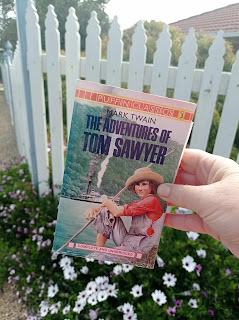It's hard to believe another year is almost done and dusted. I'm happy with my reading and reflections throughout 2023 and I've also ticked off enough Creative Writing and Communication subjects at Tabor College to acquire my Graduate Diploma. At the end of each year I re-assess whether I should keep this blog going, since it's time consuming. The same twofold reason makes me say YES again. Since I'm always writing anyway, it's another good outlet for me to hone my craft and rave about books at the same time, which I've loved doing from the time I was tiny.
Here, in no particular order, are the ten shining lights of 2023, from among the 50+ books I read and reviewed. Please click on the titles, for my reviews of each.
1) Demon Copperhead. Barbara Kingsolver's award-winning retelling of Dickens' classic novel ticks every box. It's a modern mirror in every way. The young hero Damon Fields is arguably even more charismatic than his model, David Copperfield. And this story's counterparts to Dickens' other characters make me smile and prove that human nature doesn't change. (This was a library book and therefore not in my stack photo.)
2) Little Dorrit. This year's pick from Dickens himself has put the grim Marshalsea Prison on the map of places to visit while in London. The story aimed to show the corrupting and personality-changing influence of big money, especially in the form of sudden windfalls. It is also full of deeply buried family secrets and sudden disaster.
3) Adam Bede. More Victorian drama, this time from George Eliot. I appreciate her charming pastoral touches and her pioneer spirit in venturing to focus on working class families, rather than the gentry who were normally highlighted in novels of her era. Eliot's books are valuable historical documents as well as excellent stories. This one is all about the huge impact of youthful indiscretions and the struggle to earn back trust once it is lost.
4) Treasures of the Snow. The snowy mountains of Switzerland make a great backdrop for this juvenile tale of unforgiveness and revenge. The main girl and boy, Annette and Lucien, are both excellent protagonists-cum-antagonists. And their two elderly mentors, Annette's grandmother and Lucien's unlikely friend, the gruff old man of the mountain, drop some truly wise lines we are never too old to take to heart.
5) The Man Who was Thursday G.K. Chesterton's teeming and colourful imagination brings us a fanciful, picaresque version of his own turn-of-the-century London. Gabriel Syme is a double-agent opposed to anarchy who completely misrepresents the characters of his fellow agents, who are all named after the days of the week.
6) Oliver Twist. I read two Dickens titles this year and they both make it onto my annual Best-Of list. This sweet and humble 11-year-old finds himself the pivot around which all types of low-life from the London underworld swarm. And they all have their reasons. He's in almost too deep to be rescued for the peaceful, respectable lifestyle which he craves.
7) The Adventures of Huckleberry Finn. This must be my year for finally catching up with famous classics about exceptional boys. This is an amazing tale about a misguided morality issue, and the 13-year-old whose heart prompts him to do the right thing, while his conscience accuses him of doing serious wrong. The great Mississippi River forms the backdrop of the action.
8) The Grapes of Wrath. Anger is a great prompt for social justice, when the right person wields his pen. John Steinbeck was furious enough about the plight of the displaced tenant farmers who were forced interstate to find work during the Great Depression to create the ultimate Dust Bowl novel. Several members of the down-and-out Joad family have become mouthpieces and icons of a movement which was just ripe to happen. Especially Ma, the family cornerstone; and Tom, the straight-talker with his heart for revolution.
9) The Happy Prisoner. I read this one way back in January and it's remained in my Top Ten all year. Oliver North, a young war veteran who has lost his leg, narrates this story from his bed where he's recuperating surrounded by quirky family members. The fact that his voice held me captive throughout the novel proves that any modest setting will suffice for a truly witty and winning personality to shine. And we can benefit from Oliver's hands-on revelations about busting bad moods.
10) The Adventures of Tom Sawyer. The more I read over the conversations of these impressionable, adventurous, superstitious and energetic boys, the more waves of nostalgia wash over me. We don't have to have been alive in the mid-1800s to remember how seriously we took our play-acting before we hit High School. If we have forgotten, I reckon the chats of Tom's gang will whiz us back decades.
So those are my ten top reads of 2023 and when I looked over my spread of options, they were all clear stand-outs.
Honourable Mention - Spare I'm giving this controversial memoir a quick plug because when I revisited all this year's books, I re-read my prediction that it might be among my top ten reads. Sorry Harry, it's not even close. Yet if I extended my list to 15 or 20 it might be a contender. In spite of all the flak he got for writing it, I can see how Prince Harry felt a humanitarian obligation to lift the lid on his disturbing lifestyle which made him an exhibit just for being born, and a magnet for the world's heartless media.
Wooden Spoon - Naw, I won't be mean enough to award one this year.
I wish you all happy reading and holidays as we swing into 2024. I'll touch base early in January with my plans for this blog in the year to come.
















